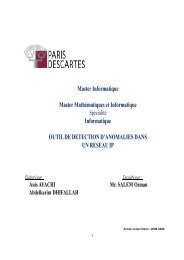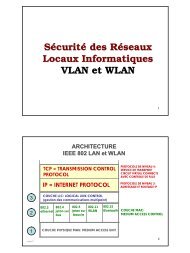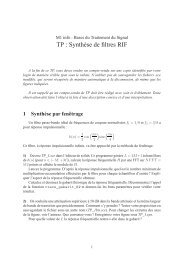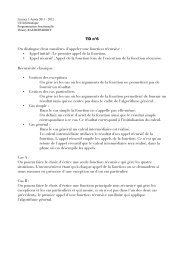Th`ese de Doctorat de l'université Paris VI Pierre et Marie Curie Mlle ...
Th`ese de Doctorat de l'université Paris VI Pierre et Marie Curie Mlle ...
Th`ese de Doctorat de l'université Paris VI Pierre et Marie Curie Mlle ...
You also want an ePaper? Increase the reach of your titles
YUMPU automatically turns print PDFs into web optimized ePapers that Google loves.
Abstract<br />
Efficient dynamic resource provisioning algorithms are necessary to the <strong>de</strong>velopment and<br />
automation of Quality of Service (QoS) n<strong>et</strong>works. The main goal of these algorithms is to<br />
offer services that satisfy the QoS requirements of individual users while guaranteeing at<br />
the same time an efficient utilization of n<strong>et</strong>work resources.<br />
In this thesis we introduce a new service mo<strong>de</strong>l that provi<strong>de</strong>s per-flow bandwidth guarantees,<br />
where users subscribe for a guaranteed rate; moreover, the n<strong>et</strong>work periodically<br />
individuates unused bandwidth and proposes short-term contracts where extra-bandwidth<br />
is allocated and guaranteed exclusively to users who can exploit it to transmit at a rate<br />
higher than their subscribed rate.<br />
To implement this service mo<strong>de</strong>l we propose a dynamic provisioning architecture for<br />
intra-domain Quality of Service n<strong>et</strong>works. We <strong>de</strong>velop a series of efficient bandwidth<br />
allocation algorithms that take explicitly into account traffic statistics and users’ utility<br />
functions to increase users’ benefit and n<strong>et</strong>work revenue.<br />
Further, we propose a mathematical formulation of the extra-bandwidth allocation<br />
problem that maximizes n<strong>et</strong>work revenue. The solution of this mo<strong>de</strong>l allows us to obtain<br />
an upper bound on the performance achievable by any online allocation algorithm.<br />
We <strong>de</strong>monstrate through simulation in realistic n<strong>et</strong>work scenarios that the proposed<br />
dynamic allocation algorithms are superior to static provisioning in providing resource<br />
allocation both in terms of total accepted load and n<strong>et</strong>work revenue, and they approach,<br />
in several n<strong>et</strong>work scenarios, the i<strong>de</strong>al performance provi<strong>de</strong>d by the mathematical mo<strong>de</strong>l.<br />
Key Words:<br />
Dynamic Bandwidth Allocation, Quality of Service, Efficient Resource Utilization, N<strong>et</strong>work<br />
Extra-Revenue, Mathematical Mo<strong>de</strong>l, Service Mo<strong>de</strong>l.










